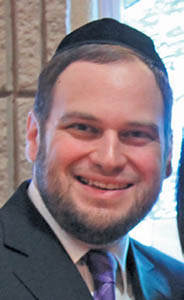
When I was a freshman in MTA I had an experience one morning that impacted not only that day, but weeks, months and years to come in a number of different ways. Every morning I would travel from Brooklyn to Washington Heights on a van that picked me up on my corner around 6 a.m. I was always able to rely on my mother to get me out of the house. When my parents went to Israel and I stayed with my best friend, however, I was worried about missing the bus since his family woke up at a later time. On the very first morning my worst fears came true. I woke up late and missed the van. While I have to admit I was a bit relieved that I would have a day off, my friend’s mother had an alternative plan. She told me to take the train with their neighbor who was going to Manhattan, and he would get me to where I needed to go. I guess something must have been lost in communication because when the train came to Columbus Circle, the gentleman told me that he was getting off the train and that I should just stay on until the stop at 182nd Street. He told me that the station for Yeshiva University was on 181st Street; he instructed me to get off and walk a block. Little did I or he know that 182nd Street was really in the Bronx. As I exited the 182nd Street station I became aware of my surroundings and was quite concerned. Nothing seemed familiar and I was scared of the way people were looking at me. There is no doubt that I sized up the people around me and knew immediately I was in potential danger. A middle-aged woman came over to me and said, “Young man, are you lost?” I judged her as well, and trusted her based on my instincts. I told her that I was looking for 181st Street and she directed me to go back into the station immediately and speak to the person at the token booth. I did, and three hours later I ended up at Yeshiva. When my mother heard the story she was mortified. It was my first experience with danger while being alone. As I remember that experience, I notice the fact that I was very judgmental of my surroundings, including the people whom I saw were standing near me. The reality is that we all judge others. When we see someone on the street walking in our direction we judge them and identify if they are a threat to us or if they are someone who is friendly. When we are in social settings we tend to judge people as well. If we really think about it, we judge people and their moods multiple times a day.
In Parshat Shemini the Torah informs us of the two identifying marks of a kosher animal; the animal must chew its cud and have split hooves. The first three animals specifically identified as not kosher are mentioned in three consecutive pesukim: the camel, the hyrax and rabbit. In describing which kosher characteristics the animal is missing, the Torah uses the present tense to describe the camel, the future tense to describe the hyrax and the past tense to describe the rabbit. This use of language seems quite intriguing. Why is a different tense used in the description of these three animals? Rav Yisroel Salanter, zt”l, explains that the Torah is giving us a tremendous insight and suggestion for our own behavior. Before we judge a person as being impure or not kosher, we should first consider all that they are and not simply what we see at the moment. If we see someone behaving in a bad way, perhaps in the past he was good or the future may be brighter for him. If we see that someone acted badly in the past, perhaps we should make our judgment based on the present without being biased concerning their past. If it seems to us that someone is going to do something contemptible, let us look at them for what they are now and not for what we think they may do in the future. Now that Pesach is behind us, we shift focus during this time of Sefira to the way we treat each other. We strive to correct the mistakes of the students of Rabbi Akiva who fell short in showing respect to their fellows. When we judge others, as we all inevitably do, we hope to do so with the benefit of the doubt and with the kindness of our hearts. We are reminded and encouraged to treat others with the honor and favor we would want for ourselves. May this period restore a sense of love and trust for our fellow Jews that Hashem expects from each of us.
By Rabbi Eliezer Zwickler
Rabbi Eliezer Zwickler is rabbi of Congregation AABJ&D in West Orange, New Jersey, and is a licensed clinical social worker in private practice. Rabbi Zwickler can be reached at [email protected].










